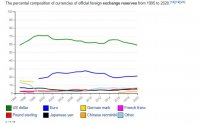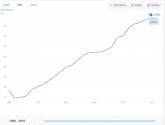Europe's energy standards are also far superior to the US. Applies to residential, business, industry sectorsDid you know printing Euros requires having them partially backed by Dollars?
As for the money printing if the Eurozone expects to maintain a positive trade balance with one of their main trade partners (US) they need to keep up with their currency depreciation rate. Otherwise the same thing would happen as it did to Japan after the Plaza Accords when they let the Yen appreciate. Their exports would implode. As is the Euro already has more weight than the Dollar in terms of exchange rate.
As for US/Canada/Mexico terrible energy usage. Stop living on suburbia people. Seriously. Everyone is spread so much horizontally that doing anything costs more. Canada has the added "benefit" of having an extremely cold climate. Also, try comparing European refrigerator sizes with US refrigerator sizes. It is an interesting comparison to say the least.
The luxury industry also uses way less energy to get the same cash result than other industries.
You are using an out of date browser. It may not display this or other websites correctly.
You should upgrade or use an alternative browser.
You should upgrade or use an alternative browser.
Chinese Economics Thread
- Thread starter Norfolk
- Start date
Wrong. The euro is a reserve currency, but it is the second reserve currency in the world, establishing itself far behind the dollar, which has 60% of the foreign exchange reserves market.what is a normal country?
ECB (far less population than US) balance sheet is bigger than US Fed and Euro hardly a reserve currency. even Japanese total debt is huge. it is just they choose not spend all on military. US developed more than 120 years ago much before reserve currency.
It was self sufficient productive continent. already decades ahead of other countries by 1930s in so many fields and has all the infrastructure and education system to absorb best people. military is just byproduct.
artificial creation of wealth through stock market has distorted the work ethic of society. why become aerospace/railway engineer or factory supervisor when software engineers can make millions and retire at early age.

A normal country is a country that does not have its currency adopted as a reserve, the demand for this currency in the international market is small, not finding room for expansive increases to cover public spending, including military, the US is the only country that manages to have this advantage because in addition to being a reserve currency, the dollar is the international exchange currency and also the unit of account.
You mentioned Japan and its huge debt. Japan went into crisis from the late 1980s and early 1990s, since then its public debt which was 40% of GDP in the 1990s is above 200% after 2020, Japan since the beginning of 2000, was trying to expand economic growth through Quantitative Easing(QE), the US also adopted this policy after the 2008 crisis.

Japan's government annual revenues plummeted due to the prolonged recession the country entered, consequently the Japanese government began issuing additional government bonds to cover interest payments. As a result of the issuance of these government bonds, the debt was not effectively paid and the amount of government bonds issued continued to grow to cover the cheaper bonds that had been issued previously. Japan has continued to issue government bonds to cover debt since the collapse of the asset price bubble.
This fiscal and monetary situation is quite different from the US in that interest is a small part of the budget deficit of the US government, although this situation is changing, in the previous two years, the US government almost went bankrupt, lawmakers raised the debt ceiling public overcoming the danger of momentary bankruptcy, but the fact is that as American economic growth is low, the printing of money that Americans make is bringing more negative consequences than expected, because economic growth no longer has as an ally to mitigate the expectations of inflation, that is, currently this monetary policy that the US uses covering deficits after budget deficits is destroying the fiscal side of the US government.
When Japan's public debt was growing, world GDP was accelerating more than in previous decades, the 2000s saw an explosion of economic growth all over the world, Japan at that time was one of the largest globalized nations.
I though western mainstream said people didn't trusted the Chinese dcep digital currency.
why they print more or allowed more than Fed?. when there is no evidence they have larger GDP.Did you know printing Euros requires having them partially backed by Dollars?
South Korea private debt is 280% of GDP. Debt is debt. some countries prefer public and some put on private households and business. it has no relationship with reserve currency.
NAFTA is one economic entity as US factories are built both in North and South. while US concentrate on services/energy/weopons.As for the money printing if the Eurozone expects to maintain a positive trade balance with one of their main trade partners (US) they need to keep up with their currency depreciation rate. Otherwise the same thing would happen as it did to Japan after the Plaza Accords when they let the Yen appreciate. Their exports would implode. As is the Euro already has more weight than the Dollar in terms of exchange rate.
EU has very small trade balance with outside world relative to money printing. EU trade balance will turn negative if current energy prices continue. US has surplus in service exports with EU. US will always win in digital exports. just look at size of international students and visa workers.
.As for US/Canada/Mexico terrible energy usage. Stop living on suburbia people. Seriously. Everyone is spread so much horizontally that doing anything costs more. Canada has the added "benefit" of having an extremely cold climate. Also, try comparing European refrigerator sizes with US refrigerator sizes. It is an interesting comparison to say the least.
The luxury industry also uses way less energy to get the same cash result than other industries.
Refrigerators now very standard. Europeans learned to to store food for more days. look at American style fridges in retail store. if there was no demand. they wont be selling so many models.
Europeans now work in temperature controlled computerized offices, EU Datacenters are built. The same power requirements are coming to Europe if electric cars continue. same temperature controlled hotels and hospital. Europe has same extreme weather phenomena. do you think Tesla Berlin use less energy than Tesla Fremont?
why do you think Saudi Arabian agreement was with US in 1933? when European powers were still there.
The basic point i am telling that US overthrow EU colonization without dollar being a reserve currency. there is no relationship between a military power and reserve currency and US will be much more militarized as it has taken the role from prior imperial powers of UK/France/Spanish/Ottoman/Portugese/Japanese. so it has to take into account wider interests regardless who is elected.
From CIA World Factbook:Yes.
PPP is definitely better at measuring Chinese and Russian military spending. The rationalisation is outlined below
"note: because China's exchange rate is determined by fiat rather than by market forces, the official exchange rate measure of GDP is not an accurate measure of China's output; GDP at the official exchange rate substantially understates the actual level of China's output vis-a-vis the rest of the world; in China's situation, GDP at purchasing power parity provides the best measure for comparing output across countries"
The longtime China bull said the U.S. and other countries could benefit from a similar approach
Ray Dalio, founder of Bridgewater, said the U.S. could benefit from a “common prosperity” approach similar to China’s.
Jan. 10, 2022 10:08 pm ET
Bridgewater Associates LP founder Ray Dalio backed China’s push for “common prosperity,” or greater equality, under President Xi Jinping and said countries such as the U.S. could benefit from a similar approach.
Beijing’s pursuit of common prosperity has been a driver behind its wide-ranging crackdowns on sectors such as e-commerce, videogames, property and after-school tutoring. The heightened regulatory pressure in turn has caused steep declines for many Chinese stocks listed in the U.S. and Hong Kong, and prompted many investors to reassess the risks and rewards of Chinese assets.
Mr. Dalio, a longtime China bull, however, has warned market watchers not to misinterpret the actions as demonstrating that Chinese leaders were “showing their true anticapitalist stripes,” and has stressed the benefits of investing in the country.
“Common prosperity is a good thing,” Mr. Dalio said in a video appearance at UBS Group AG’s Greater China Conference on Monday. “It’s another way of saying prosperity for most people.”
Mr. Dalio said his views on the topic were “pretty much aligned” with those of the Chinese leadership, and widespread opportunity would lead to a better economy and a fairer system.
“As Deng Xiaoping and others understood, it’s a cycle,” Mr. Dalio said. “First you get rich, and then you make a point of distributing those opportunities in a more equal way.” Mr. Deng, China’s former paramount leader, unleashed economic reforms from the late 1970s onward. Those changes allowed China to grow much faster than it had under former Communist Party leader Mao Zedong, who died in 1976.
“A lot of people don’t know the true thinking, even though there have been attempts to describe it, and tend to make the mistake of thinking that this is like a return to communism under Mao, rather than understanding it’s just part of the evolutionary process,” he said.
Mr. Dalio said he thought that through its own system, the U.S. “needs more common prosperity, a lot of countries do.” His presentation showed U.S. wealth and income gaps at heights last hit in the 1930s.
Ahead of the same conference, a senior banker told reporters that China was committed to welcoming global investors and to further opening up its financial markets.
Tommie Fang, UBS’s head of China global markets, said Friday that he had recently spent a week in Beijing meeting with financial regulators. Mr. Fang said he had seen “a lot of positive energy, pro-business and opening-up” attitude in his meetings with the central bank, securities, banking and foreign-exchange regulators, and leadership at the new Beijing Stock Exchange.
In late July, after a crackdown on tutoring roiled markets, the China Securities Regulatory Commission met privately with representatives of global financial institutions and tried to assuage investors’ concerns, saying China would consider the market impact before introducing future policies.
Mr. Fang, who attended the July meeting, said: “I firmly stand by the view that the policy environment in China is more stabilized and the valuations are more attractive versus the beginning of last year.”
He said Chinese regulators were “making very clear and dedicated efforts to enhance the dialogue” with their U.S. counterparts over U.S.-listed Chinese companies, which face the threat of delisting in a dispute over access to audit papers.
Mr. Dalio told conference attendees that his hedge-fund management firm had thrived since it started applying its all-weather approach, which aims to make money regardless of broader market moves, to investing in mainland China.
“We’ve been doing that for about three years onshore. That’s done very well, whether the direction of the market is up or down. I’m just thrilled to be a participant,” he said. In November, The Wall Street Journal reported that Bridgewater had raised the equivalent of $1.25 billion for its third investment fund in China, its largest to date.
Mr. Dalio advised investors to be wary of holding cash, given its drawbacks on an inflation-adjusted basis. “Stop viewing cash as a safe investment. Investors think of cash as safe because it doesn’t have much volatility. The mind-set needs to change,” he said.
